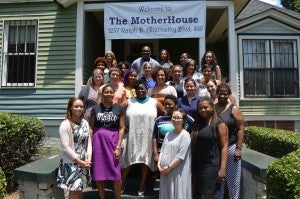This post is part of “Inequities in Maternal Mortality in the U.S.,” a blog series hosted by the MHTF.
 The United States (U.S.) lags behind much of the world in terms of ensuring maternal health and survival. Despite spending more money on health care than any other high-income country, the U.S. maternal mortality rate is worse than 45 other countries, including the United Kingdom, Japan, and Libya.
The United States (U.S.) lags behind much of the world in terms of ensuring maternal health and survival. Despite spending more money on health care than any other high-income country, the U.S. maternal mortality rate is worse than 45 other countries, including the United Kingdom, Japan, and Libya.
Moreover, while most countries are making progress toward better maternal survival rates, the situation in the U.S. is backsliding. Today, women in the U.S. are actually more likely to die as a result of pregnancy or childbirth complications than they were two decades ago, and Black women are nearly four times more likely to die than White women. These trends are a wake-up call that rising maternal mortality and morbidity is not only an issue for women outside our borders – it is a domestic human rights crisis.
Over the past year, the international community has called for urgent action to address this crisis. In August 2014, the UN Committee on the Elimination of Racial Discrimination (CERD) raised concerns about the U.S. failure to eliminate disparities in sexual and reproductive health, including maternal mortality (available in other languages), and called on the government to improve data collection and accountability systems. In May 2015, the UN Human Rights Council facilitated a review of the U.S. and issued a recommendation from Finland calling on the U.S. to ensure equal access to quality maternal health services. And just this month, members of a UN Working Group concluded a visit to the U.S. with a recommendation that government authorities summon the political will to remedy pervasive racial disparities in maternal health.
These international critiques help to raise awareness of maternal health problems in the U.S. by showing that other countries have done far more to reduce their maternal mortality rates, and with fewer resources. They also support a more expansive approach to the issues involved, urging a disruption of the professional silos that inhibit our ability to address a problem as complex as maternal mortality. Most importantly, human rights standards remind us that preventable maternal mortality violates a fundamental contract between government and its citizens, and that government ought to be held accountable when it breaks.
Efforts at the local level are spurring this renewed attention from international human rights bodies by empowering Black women and elevating their voices. In 2014, SisterSong, a reproductive justice organization based in Atlanta, hosted story circles with Black women living in the South. The Center for Reproductive Rights partnered with SisterSong to document these stories, which were included in a report to the International Convention on the Elimination of All Forms of Racial Discrimination (ICERD). As ICERD reviewed U.S. efforts to eliminate racial discrimination, the stories summarized in the report provided crucial information about discrimination in health.
Building on that momentum, we invited a group of experts to a multi-disciplinary convening at the SisterSong Mother House in June 2015. The “Black Mamas Matter” convening included academics, public health practitioners, doctors, midwives, doulas, community organizers, policy experts, funders, and advocates. Participants—many of whom are Black women from the South—shared information, identified current challenges, articulated visions for the future, and discussed strategies.
One key theme that emerged was the need to openly discuss the impact of racial discrimination on maternal health outcomes. This requires looking at the experiences of Black women that go beyond the clinical encounter and begin well before they become pregnant. Participants identified the need to address structural inequalities that influence the social determinants of health, particularly for women of color. These include access to quality health care along the entire reproductive life course, safe, affordable housing, and paid parental leave. They noted the importance of confronting racial bias in health care settings, and called for better health surveillance systems and data collection methodologies that capture the lived experiences of Black women. In short, their collective vision is a holistic health care model that invests in Black women and their families.
Since the Black Mamas Matter convening, participants have been cultivating a cross-sectoral network of individuals and organizations committed to addressing Black women’s maternal health in the South. CRR is also working closely with members of this network to develop a toolkit for state-based advocates interested in learning more about the problem and potential policy solutions.
The policy solutions we propose are grounded in reproductive justice theory and human rights law. This approach is valuable because it recognizes the intersectionality of rights, issues and identities in ways that our domestic legal and policy framework does not. The human rights frame is also unique in that it emphasizes participation and transparency throughout decision-making processes. In the U.S. context, a human rights-based approach to maternal health policy cannot be implemented without the participation of Black women. Instead, it depends on recognizing Black women’s leadership, and scaling up the work that they are already doing in their communities.
